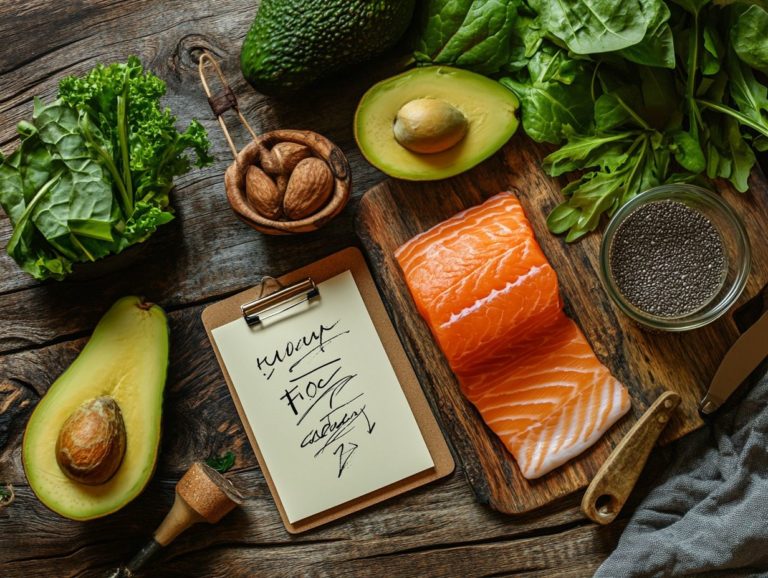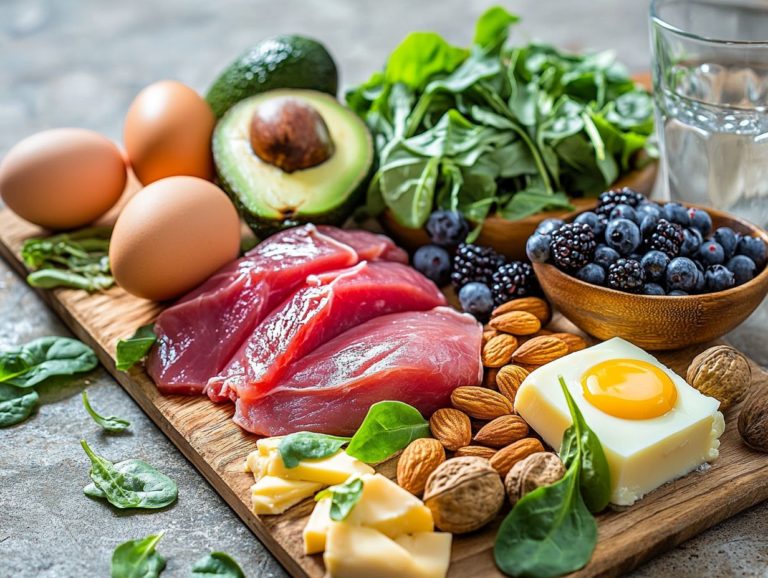Keto Diet and Meal Timing: Common Questions
The Keto diet has surged in popularity, renowned for its potential health benefits, especially in weight loss and blood sugar management.
You ll find that the timing of your meals can play a crucial role in enhancing its effectiveness.
This article delves into the essentials of the Keto diet, highlighting its myriad benefits from improved heart health to effective diabetes management and the guidelines you should follow.
Common questions regarding meal timing and fasting will be addressed, offering you practical insights to optimize your Keto journey.
Explore further to uncover how to fully embrace and thrive in this low-carb lifestyle!
Contents
Key Takeaways:

- The keto diet has been shown to have potential benefits for weight loss, heart health, and diabetes management.
- Avoid high-carb foods and aim for a macronutrient ratio of 70-75% fat, 20-25% protein, and 5-10% carbs on the keto diet.
- Intermittent fasting can be beneficial on the keto diet, but it is important to listen to your body and find a meal timing schedule that works best for you.
What is the Keto Diet?
The keto diet, often referred to as the ketogenic diet, is a low-carb, high-fat approach that invites you to significantly cut down on carbohydrates while embracing healthy fats.
This exciting dietary approach gets your body into ketosis, turning it into a fat-burning machine!
Its popularity has surged not just for weight loss, but also for its myriad potential health benefits and therapeutic uses, particularly in managing conditions like epilepsy, as highlighted by reputable sources such as the Mayo Clinic and the Epilepsy Foundation.
Experts like Scott Keatley and Kendra Whitmire further underscore its effectiveness in transforming bodies and enhancing metabolic health.
What are the Benefits of the Keto Diet?
The keto diet presents a wealth of benefits that can enhance your well-being, including weight loss, improved metabolic health, and superior control over insulin levels and blood sugar crucial factors for those managing diabetes or conditions like PCOS.
Research published in esteemed journals such as the Journal of Clinical Endocrinology, along with studies endorsed by the American Diabetes Association, showcases the diet’s effectiveness in promoting nutritional ketosis. This means your body burns fat for energy while minimizing carbohydrate intake.
Be aware that you might encounter some side effects, often referred to as the keto flu, during the initial transition. Experts like Jessica Migala and Kelly Kennedy emphasize the importance of being informed about both the benefits and potential health risks associated with this dietary approach.
By arming yourself with knowledge, you can navigate the keto journey with confidence and make the most of its advantages.
Does the Keto Diet Help with Weight Loss?
The keto diet can indeed be your ally in weight loss, as it induces ketosis a metabolic state where your body shifts gears and burns fat for fuel instead of carbohydrates.
This dietary approach significantly alters your insulin levels, which in turn can lead to decreased cravings and appetite, creating that all-important caloric deficit for weight loss.
By prioritizing protein intake and healthy fats while cutting back on carbohydrates, many who embrace the keto lifestyle report impressive weight loss results over time.
As you transition into ketosis, your body undergoes several hormonal adaptations that favor fat burning, primarily through the reduction of insulin levels.
With lower insulin levels, you not only facilitate the mobilization of fat from your adipose tissue but also enhance the utilization of fatty acids as an energy source. This metabolic shift boosts the production of ketones energy-rich molecules derived from fat that further supports your body s ability to efficiently tap into fat stores.
Research shows that for many, this biochemical environment leads to reduced hunger, making it easier to stick to calorie limits without the constant feeling of deprivation.
Experts in nutritional science point to these mechanisms as key reasons why the keto diet can be so successful for weight loss.
Start your Keto journey today and transform your health with the benefits of this remarkable diet!
Does the Keto Diet Improve Heart Health?
Discover how the keto diet can change your life! The keto diet has the potential to enhance your heart health by encouraging you to embrace healthy fats, such as those found in olive oil, salmon, and avocados, while simultaneously reducing your intake of refined carbohydrates that can adversely affect cholesterol levels and blood sugar.
By focusing on a diet rich in omega-3 fatty acids and monounsaturated fats, you could lower triglycerides and boost HDL cholesterol both of which are beneficial for your cardiovascular health. It’s crucial to remain mindful of your saturated fat intake and how your body responds to dietary changes.
Benefits of the Keto Diet on Heart Health
Research indicates that not all fats are created equal. The choices you make within a ketogenic framework can significantly impact your overall heart health.
Numerous studies, including those conducted by cardiologists, show that following the keto diet can improve your cholesterol levels, resulting in a reduction of harmful LDL cholesterol.
Regularly monitor your heart health markers and adjust your fat sources as needed. A personalized approach to the keto diet, paired with lifestyle choices like consistent physical activity, can help mitigate potential risks, making it a heart-healthy option for anyone looking to enhance their cardiovascular well-being.
Does the Keto Diet Help with Diabetes Management?
Take control of your health today! The keto diet can indeed be a powerful ally in diabetes management, helping you stabilize blood sugar levels and enhance insulin sensitivity. By significantly cutting back on carbohydrates, you can experience a notable reduction in glucose spikes, which is vital for effectively controlling diabetes.
Research supported by the American Diabetes Association suggests that the ketogenic diet can aid individuals with type 2 diabetes in achieving improved metabolic control. This often leads to reduced reliance on medications and enhanced overall health. This dietary approach may also benefit those dealing with PCOS, given its positive effects on insulin levels and hormonal balance.
This lifestyle encourages your body to enter a state of ketosis, where it shifts from burning carbohydrates for fuel to utilizing fat instead. Studies have shown that this transition not only reduces glucose production in the liver but also lessens the insulin response required after meals.
Experts underscore the necessity of monitoring your ketone levels to ensure your body is thriving on this diet. If you’re contemplating this shift, consulting with healthcare professionals is highly recommended to tailor the diet to your unique health needs while minimizing potential risks.
Incorporating practical tips can further enhance your experience:
- Focus on whole foods
- Stay well-hydrated
- Keep an eye out for hidden sugars lurking in processed items
What are the Guidelines for the Keto Diet?
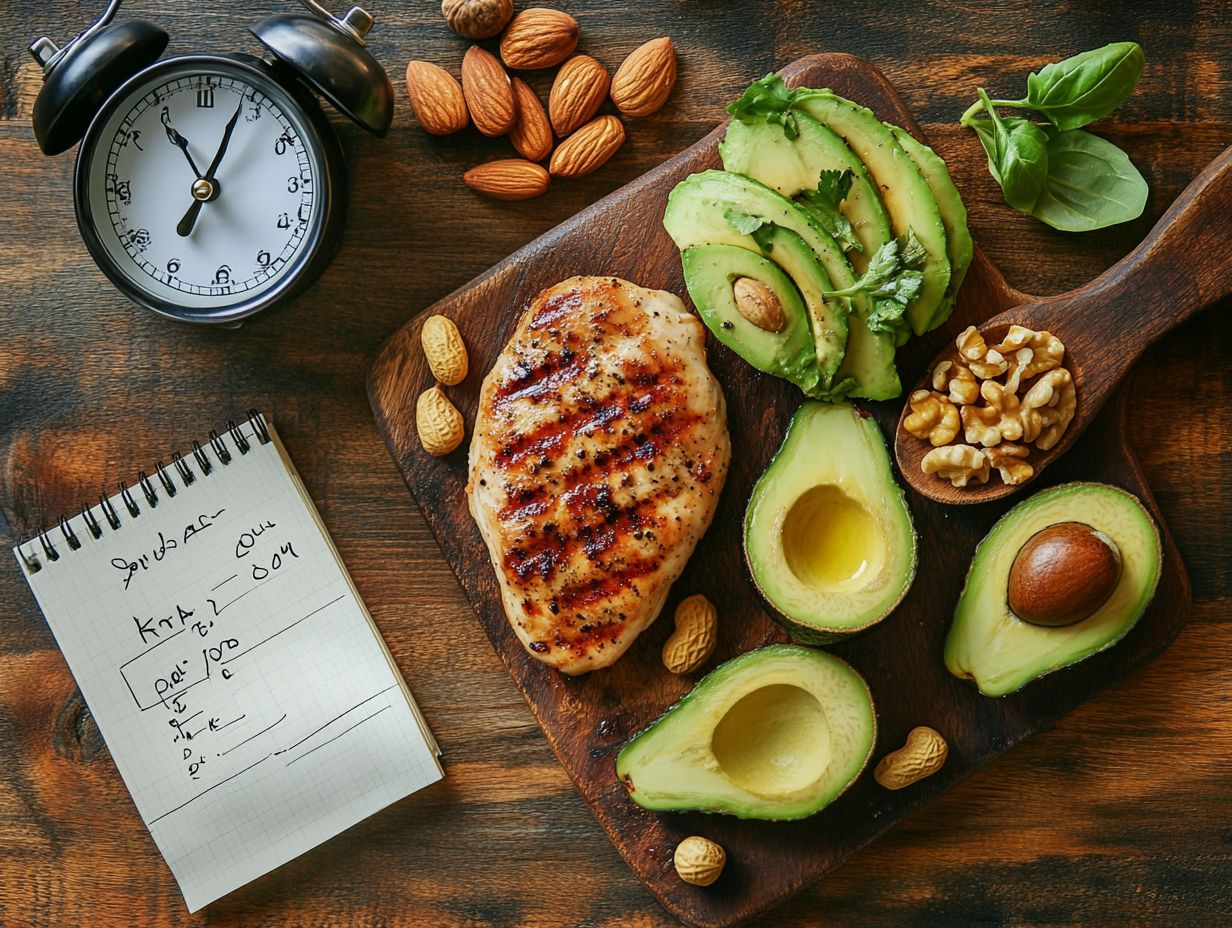
To successfully embrace the keto diet, you must adhere to specific guidelines that highlight a low carbohydrate and high-fat intake. This typically means aiming for a macronutrient ratio of around 70% fat, 25% protein, and just 5% carbohydrates.
This shift in your eating habits requires you to prioritize keto-friendly foods like avocados, nuts, and fatty fish, while steering clear of high-carb options such as bread, pasta, and sugary snacks.
As you navigate these dietary changes, closely monitoring your macronutrient intake becomes vital for achieving and maintaining ketosis.
What Foods are Allowed on the Keto Diet?
Healthy Fats, Proteins, and Vegetables to Include
The keto diet invites you to explore a delightful array of keto-friendly foods rich in healthy fats and moderate in protein, such as olive oil, salmon, avocados, eggs, and nuts. These foods are your allies in ensuring you consume adequate dietary fat while keeping carbohydrates in check.
By incorporating these ingredients into your meals, you re not only working towards achieving ketosis but also enhancing your overall health and wellness with essential nutrients and bioactive compounds.
Beyond these staples, you can find healthy fats in sources like coconut oil and butter, both of which deliver energy and elevate the flavor of your dishes.
Regarding proteins, options like grass-fed beef, chicken, and fatty fish not only provide essential amino acids but also support muscle maintenance.
Don t overlook low-carb vegetables like spinach, broccoli, and zucchini; they are incredibly nutrient-dense, offering vital vitamins and minerals without the excess carbohydrates that can disrupt ketosis.
Choose foods from these categories to create satisfying meals that perfectly align with the keto approach while maximizing your nutritional benefits.
What Foods Should be Avoided on the Keto Diet?
High-Carb Foods to Eliminate
On the keto diet, it s essential to steer clear of foods that are high in carbohydrates to maintain that coveted state of ketosis. This means saying goodbye to sugary snacks, grains, high-sugar fruits, and starchy vegetables like potatoes and corn.
Processed foods are also best minimized, as they often harbor hidden sugars and unhealthy additives that can sabotage your weight loss goals and disrupt insulin levels.
By avoiding these food categories, you ll find it easier to stick to the balance of fats, proteins, and carbs you need for successful keto dietary changes.
Certain legumes and high-sugar dairy products can increase your carb intake, so it s wise to keep an eye on those as well.
Consider swapping out traditional pasta for zucchini noodles or replacing rice with cauliflower rice these alternatives can keep you on track without sacrificing flavor.
When cravings strike, delight in delicious keto-friendly snacks like almonds or cheese crisps! Planning your meals and keeping healthy snacks within easy reach will help you combat temptation and ensure you adhere to the principles of a ketogenic lifestyle with confidence.
What is the Recommended Macronutrient Ratio for the Keto Diet?
Understanding Your Dietary Needs
The keto diet typically recommends a macronutrient ratio of about 70% dietary fat, 25% protein, and a mere 5% carbohydrates, all geared toward promoting nutritional ketosis.
This precise ratio encourages your body to use fat as its primary fuel source, leading to efficient fat burning and weight loss. Sticking to these guidelines is crucial for anyone aiming to achieve and maintain ketosis; even minor deviations can disrupt the diet’s effectiveness.
To effectively track your macronutrient intake, consider using smartphone apps or food diaries that allow you to log your meals and analyze their macronutrient breakdown.
Incorporating meals such as:
- Avocado and bacon omelets
- Grilled salmon with saut ed spinach in olive oil
- A hearty salad topped with nuts and cheese
can help you maintain the recommended ratios. These satisfying meals not only curb your hunger but also keep your body in a fat-burning state, maximizing the benefits of your ketogenic lifestyle.
How Does Meal Timing Affect the Keto Diet?
Meal timing holds considerable importance in the effectiveness of the keto diet, significantly impacting insulin levels and blood sugar regulation.
By thoughtfully scheduling your meals, you can amplify your chances of reaching ketosis and reaping the rewards of weight loss.
You might discover that integrating intermittent fasting into your routine offers even more advantages, as it enables your body to tap into fat stores more efficiently while reducing the insulin spikes that often accompany frequent eating.
Is Intermittent Fasting Recommended on the Keto Diet?
Intermittent fasting is often recommended alongside the keto diet, and for good reason it can amplify your body’s ability to enter and maintain ketosis. By extending your fasting window, you allow your insulin levels to drop significantly. This drop aids in fat oxidation.
It also promotes better blood sugar control. When you combine a ketogenic diet with intermittent fasting, you may find yourself on the path to improved metabolic health and effective weight management.
There are several popular methods of intermittent fasting that can seamlessly integrate into your keto lifestyle. The 16/8 method, where you fast for 16 hours and eat during an 8-hour window, is a favorite due to its simplicity and convenience. Alternatively, you might consider the 5:2 approach, which allows you to consume a very low-calorie diet on two non-consecutive days while enjoying normal eating on the other five.
Each of these methods brings potential benefits, such as increased fat loss and enhanced mental clarity. However, they can also present challenges, like hunger pangs or the difficulty of adjusting to the fasting schedule. Stay hydrated to thrive in this combined approach! It’s crucial to focus on nutrient-dense foods during your eating windows and listen to your body to discover the rhythm that suits you best.
What is the Best Time to Eat on the Keto Diet?
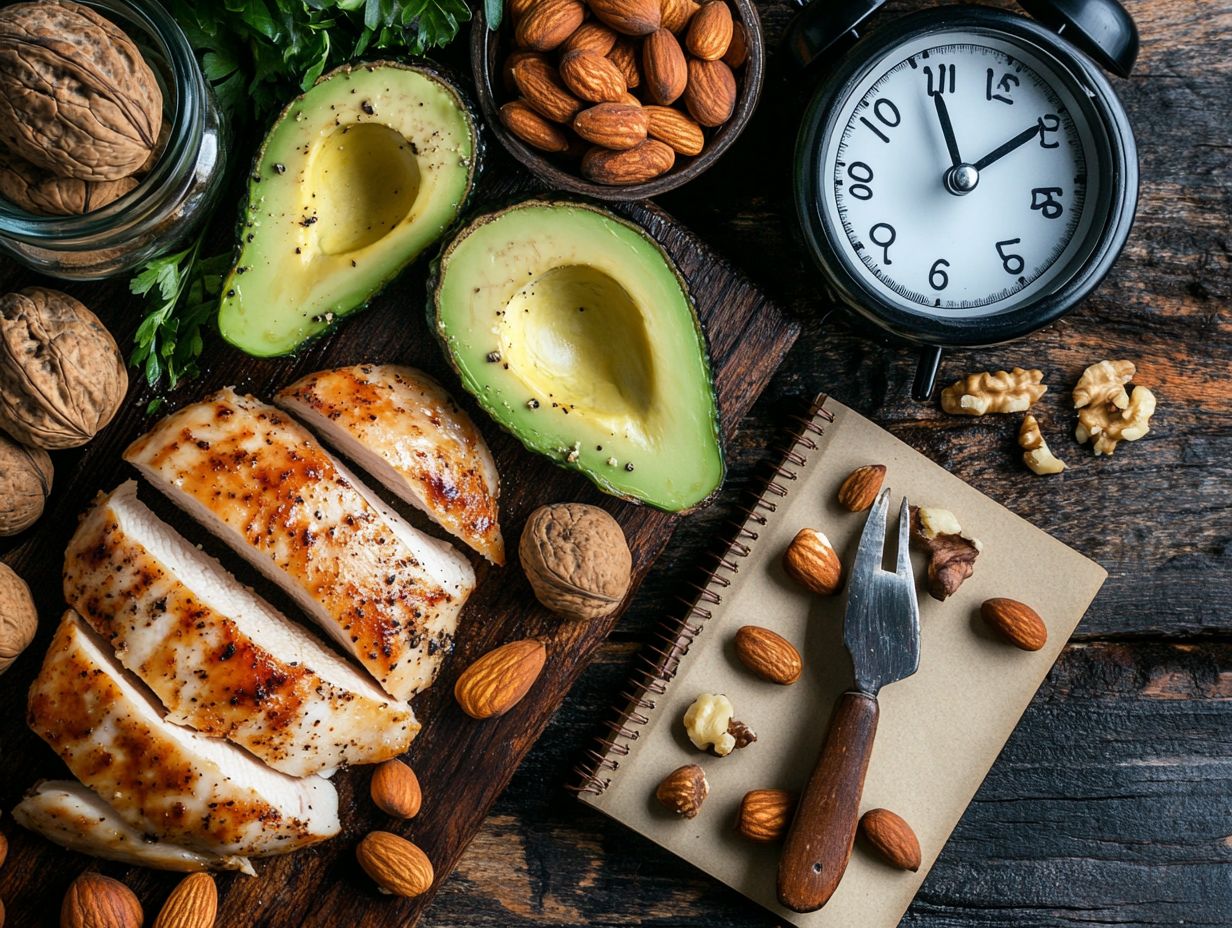
The ideal time for you to eat on the keto diet often hinges on your personal preferences and lifestyle. Many keto enthusiasts discover that reducing meal frequency can help them maintain ketosis more effectively.
You might find that two meals a day suit you perfectly, while others may prefer three based on their hunger levels and daily schedules. Aligning your meal times with intermittent fasting can further support blood sugar control and amplify the benefits of keto.
To find what truly works for you, it s crucial to listen to your body and observe how different eating patterns impact your energy levels and overall well-being. Experimentation is key; you might thrive by having breakfast, while someone else may flourish with an afternoon meal schedule.
Your personal goals whether it’s promoting fat loss or optimizing athletic performance can significantly shape your meal timing decisions. By considering your daily routines, exercise habits, and specific dietary objectives, you can customize your meal frequency to boost both satisfaction and the effectiveness of your keto journey.
Should Meals be Spaced Out or Eaten Close Together on the Keto Diet?
The choice of whether to space out your meals or keep them close together on the keto diet really hinges on your personal preferences and how your body reacts to food in terms of blood sugar levels and hunger signals.
You might discover that giving yourself more space between meals helps you maintain better appetite control and steadier insulin levels. On the other hand, some may prefer a tighter meal schedule for convenience and to avoid those pesky energy dips.
Understanding how your body responds is crucial for optimizing this aspect of your diet. Finding this balance can help prevent feelings of deprivation while keeping your energy levels steady throughout the day.
It s vital to emphasize whole, nutrient-dense foods in whichever approach you choose, as they play a significant role in promoting lasting satiety and overall well-being. If you lean towards spaced meals, experimenting with intermittent fasting could be a valuable strategy.
Alternatively, you may thrive on three regular meals complemented by quality snacks in between to keep your energy up. Ultimately, it s essential for you to evaluate your daily routines and personal activity levels, adjusting your meal timing to support your unique lifestyle and health objectives.
What are Common Questions about the Keto Diet and Meal Timing?
As you delve into the keto diet and consider its influence on meal timing, you ll likely encounter several pressing questions regarding its practicality and effectiveness.
You might find yourself pondering the compatibility of coffee or tea during fasting periods, the viability of exercising while in a fasted state, and whether taking supplements could disrupt your state of ketosis.
Consider the implications of consuming alcohol and how to adjust your meal timing for social events.
Can I Drink Coffee or Tea While Fasting on the Keto Diet?
Drinking coffee or tea while fasting on the keto diet is not just acceptable; it can be quite beneficial. These beverages are low in calories and can help keep your appetite in check. Black coffee and herbal teas can even bolster your ketogenic state by enhancing fat oxidation and providing a rich source of antioxidants.
Just remember to steer clear of sugar and high-carb creamers that could throw you out of ketosis. In fact, both drinks can give your metabolism a little kick, which can further support your weight loss journey and boost your energy during fasting periods.
The caffeine in coffee can temporarily elevate your metabolic rate, while certain teas, especially green tea, contain compounds that not only promote fat burning but also sharpen your mental clarity and focus.
If you’re following keto guidelines, consider preparing your beverages with unsweetened almond milk or a sprinkle of cinnamon to add a delightful flavor without compromising your carb limit. Whether you enjoy them warm or iced, these drinks can transform your fasting experience into something refreshing, making it all the more enjoyable and sustainable.
Can I Exercise While Fasting on the Keto Diet?
Exercising while fasting on the keto diet is not only feasible but can also significantly enhance your fat-burning potential and boost your energy levels. You may find that your body adapts remarkably well to working out in a fasted state, tapping into fat stores for fuel instead of relying on carbohydrates. This aligns perfectly with your ketogenic goals.
It s essential to listen to your body and adjust the intensity and duration of your workouts accordingly. This approach empowers you to tap into your energy reserves like never before, especially as your body becomes more accustomed to ketosis, a key aspect of the ketogenic diet.
The combination of fasting and exercise can lead to improved endurance and weight loss, but it s important to keep in mind that everyone s response may differ. You might notice some fluctuations in performance or even fatigue during intense workouts when fasting.
Therefore, incorporating lighter, high-intensity workouts or strength training can help you maintain balanced energy levels and optimize recovery. Consider adjusting your protein intake and carbohydrate intake to better support your activity levels.
Don t forget to stay hydrated and keep your electrolytes in check. This will optimize your workout effectiveness during fasting periods, allowing you to sustain your exercise routine while promoting fat loss.
Including healthy fats such as olive oil, salmon, and avocado can also support overall health.
Can I Take Supplements While Fasting on the Ketogenic Diet?
Taking certain supplements while fasting on the ketogenic diet can be quite beneficial, especially when they align with your nutritional needs and enhance your overall health. Supplements such as electrolytes, magnesium, and omega-3 fatty acids can help reduce side effects from changing your diet, like the dreaded keto flu, and ensure your body receives essential nutrients during fasting periods.
Incorporating B vitamins and vitamin D can significantly boost your energy levels and help stabilize your mood. It s essential, however, to approach supplementation with a discerning eye; always consult a healthcare professional before embarking on any new regimen. This is particularly crucial if you have underlying health conditions like PCOS (Polycystic Ovary Syndrome) or are taking medications, as some supplements may interact negatively with prescribed treatments.
By practicing mindful supplementation, you can elevate your fasting experience on the ketogenic diet, paving the way for optimal health and well-being.
For any further questions about fasting and supplements, please consult a healthcare professional to ensure you are making the best choices for your health.
Can I Drink Alcohol While on the Keto Diet?
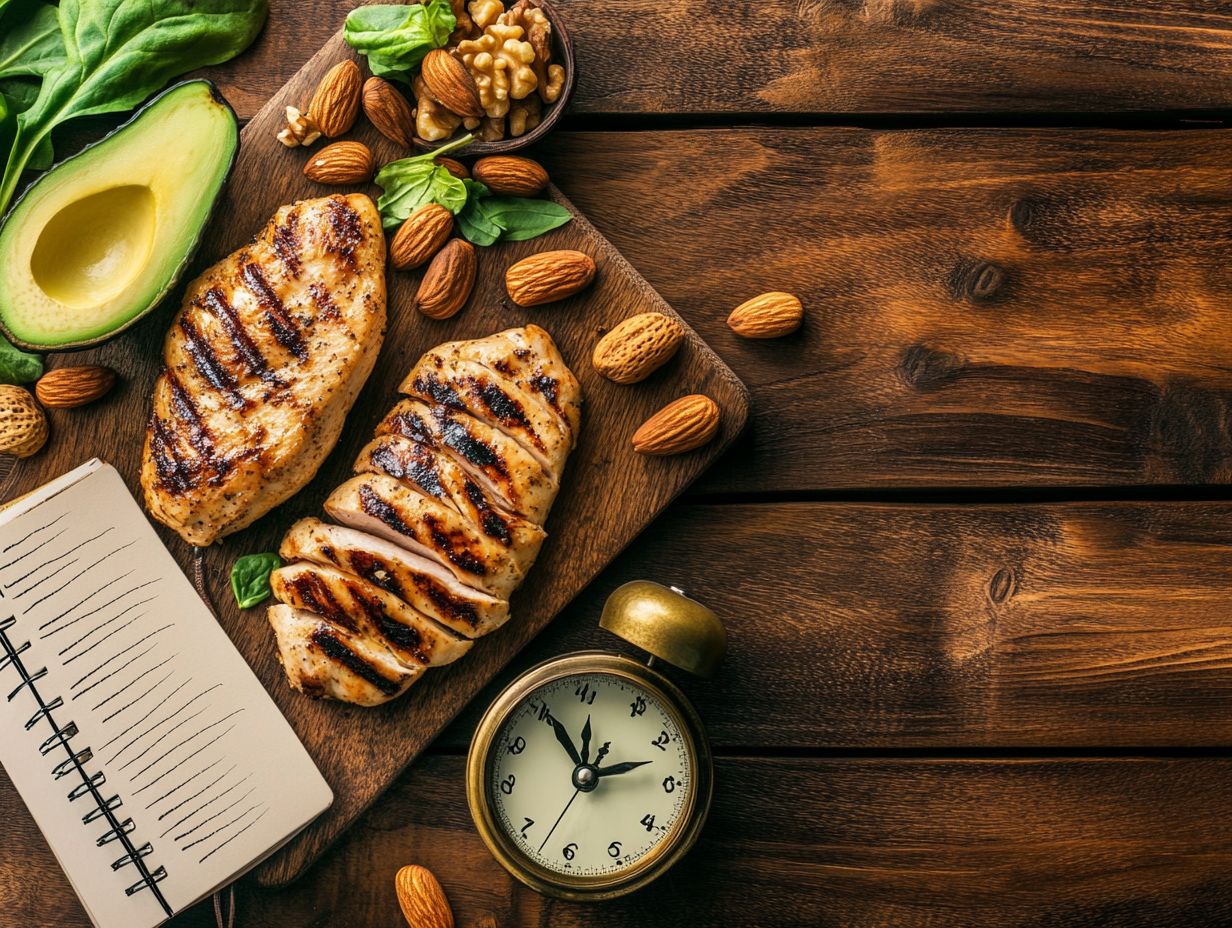
While indulging in a drink on the ketogenic diet is certainly possible, it’s vital for you to choose low-carb options to maintain your state of ketosis. You can indulge in delightful drinks like dry wines, spirits, and sugar-free mixers in moderation without causing significant spikes in your blood sugar levels.
Just remember to keep an eye on your portion sizes, as alcohol can lower your inhibitions and lead to less-than-ideal food choices. Understanding what qualifies as keto-friendly will aid you in maintaining the necessary balance for this low-carb diet.
For example, selecting spirits like vodka, gin, or whiskey served neat or mixed with a calorie-free beverage lets you enjoy a drink without the extra carbs typically found in sugary cocktails. Steering clear of beer is a wise move, as it often harbors hidden sugars.
Responsible drinking is all about being aware of how alcohol affects your metabolism. It s crucial for you to listen to your body, ensuring your choices align with your dietary goals while still enjoying those social moments.
Consulting sources like the American Diabetes Association can provide additional guidance on managing blood sugar levels while drinking.
Can I Adjust My Meal Timing on the Ketogenic Diet for Social Events?
Adjusting your meal timing on the ketogenic diet for social events is not only feasible but often encouraged. This allows you to relish social interactions without sacrificing your dietary goals.
By planning ahead scheduling your meals around gatherings or choosing keto-friendly options when dining out you can remain committed to your diet while still enjoying quality time with friends and family.
Being proactive in meal preparation can truly transform your experience. By preparing snacks or meals in advance, you can fend off the temptation of carbs when attending parties or dining out.
This is especially important when dealing with dietary changes that could affect your weight loss results.
Regarding choosing restaurants, seek out establishments that offer customizable menus or healthy alternatives that fit within your keto lifestyle. Communicating your dietary preferences in advance can help inform your hosts, ensuring everyone is aligned.
This makes navigating social occasions while staying true to your health goals a breeze. Resources like the Mayo Clinic can also be useful in finding keto-friendly foods when dining out.
Watch this video to learn more about the Keto Diet and its benefits!
Frequently Asked Questions
What is the Keto Diet and how does it work?
The Keto Diet is a high-fat, moderate-protein, low-carbohydrate eating plan that forces the body to burn fat for energy instead of carbohydrates. This state is called ketosis and is achieved by drastically reducing carbohydrate intake and increasing healthy fats consumption.
It was originally developed for managing epilepsy and has since been adapted for weight loss and other health benefits.
Why is meal timing important on the Keto Diet?
Meal timing is important on the Keto Diet because it helps to maintain a consistent state of ketosis. By spacing out meals properly and following a consistent eating schedule, you can ensure that your body stays in the fat-burning state.
This avoids any potential blood sugar spikes from irregular meal timing. Consulting experts like Scott Keatley and Kendra Whitmire can provide personalized advice.
How many meals should I eat per day on the Keto Diet?
The number of meals you eat per day on the Keto Diet is up to personal preference and individual needs. Some people find success with three meals a day, while others prefer to have smaller, more frequent meals.
It is important to listen to your body and find a meal frequency that works best for you. Experts like Kelly Kennedy and Jessica Migala can offer guidance on optimal protein intake and dietary fat ratios.
Can I skip meals on the Keto Diet?
Skipping meals may seem like a quick way to lose weight. However, it is not recommended on the Keto Diet.
Skipping meals can lead to blood sugar imbalances and may cause your body to go into starvation mode. This can slow down your metabolism and hinder weight loss progress.
It is important to stick to a consistent meal schedule on the Keto Diet. Insights from the Journal of Clinical Endocrinology and Nutrition Metabolism can provide a deeper understanding of this.
Should I time my meals around my workouts on the Keto Diet?
Timing meals around workouts can be beneficial on the Keto Diet. Eating a meal containing healthy fats and protein before a workout can provide sustained energy and help with muscle recovery.
You don t have to time your meals around your workouts if you stick to a regular eating schedule. The U.S. Department of Agriculture offers valuable resources on aligning meal timing with exercise routines.
Is it important to track my meal timing on the Keto Diet?
Tracking your meal timing can be a game-changer! It can help you establish a routine and ensure that you are eating at consistent intervals when starting the Keto Diet.
Once you have established a meal schedule that works for you, tracking may not be necessary as long as you continue to follow your schedule and stay in a state of ketosis. Ketosis is when your body burns fat for energy instead of carbs.
Using mobile apps or consulting with a nutrition expert can aid in this process. Wondering what to eat before your workout?

